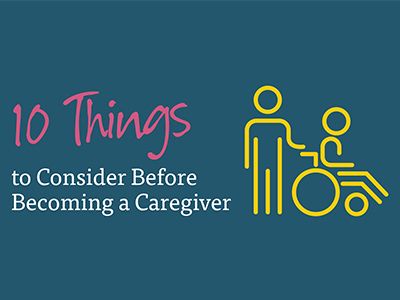It's a significant task many people will one day take on: taking care of an ailing spouse, relative, neighbor or friend. And while you do it out of love and consideration, the costs can add up. According to a 2016 AARP® study, it’s estimated that family caregivers spend an average of $6,954 on out-of-pocket costs related to caregiving, nearly 20 percent of their annual income.
To cover the extra expense, many caregivers have to pare back their own spending. The cutbacks vary from saving for retirement to leisure spending, eating out and vacations, with many people dipping into personal or retirement savings. To protect your financial future while doing your best for your loved one, consider these eight tips:
- Get the whole family onboard. If you have siblings, it's not realistic to expect that each one will carry an equal load in caregiving responsibilities. Some might be able to contribute more money than time, for example. That's okay. Play to everyone's strengths. Get together and work out a plan for providing help. It's ideal to have this conversation early, if possible, while everyone's still healthy.
- See if you can get paid for taking care of the loved one. If you’re going to be the primary caregiver, other family members may be willing to pay you for it. After all, your services may make it possible to avoid larger costs — such as nursing home care — that would require your loved one to leave his or her home. (Unfortunately, Medicare does not pay independent caregivers — including family members — for their services.)
- Spend your loved one's money first. It may be smarter to use your parents' funds first for many reasons. This can minimize the size of their estate taxes, and spending down their money might qualify them for Medicaid benefits that include help with long-term care.
- Plan carefully before leaving a job or going part-time. Leaving a job or reducing your hours is tempting when you want to care for someone you love, but it might not always be the best answer. Consider the benefits you'll be giving up. And know your rights. Under the Family and Medical Leave Act, if your company has 50 or more workers and you've been on the job for at least a year, you may be entitled to 12 weeks of unpaid leave to take care of a family member.
- Avoid dipping into your 401(k) plan. Your retirement plan is about protecting and building your savings. Plan withdrawals or loans may provide short-term relief but also may mean additional tax penalties and losing the potential to earn compound interest over time. If you do leave your job, maximize your retirement savings in preparation. Keep setting aside contributions to a rollover account.
- Check your loved one’s availability for benefits. Your loved one may qualify for additional benefits or programs. For example, veterans (and spouses) might qualify for certain benefits. Other government programs, including Social Security, Medicare, Medicare Part D Extra Help Program and Medicaid, are also available to those over age 65 or under the federal poverty limit. For more information, visit benefitscheckup.com, a free service of the National Council on Aging, which monitors the benefits landscape for updates and changes to policies and programs.
- Ask for community help. Consider asking for help in your immediate neighborhood or community. Search for local programs, volunteer organizations or church groups that may be able to help pitch in with the day-to-day demands of caregiving, which may provide some financial or physical relief.
- Seek legal guidance. To avoid surprises and hardship caused by unexpected or huge expenses, talk with an attorney who focuses on elder care law and can help you sort through all the needs and options for your loved one’s care, as well as counsel you on what steps to take to get your loved one’s affairs in order with advance directives, powers of attorney and a will.
Providing care for a loved one can be a rewarding, yet incredibly challenging experience. Planning ahead, making informed decisions and getting the help you need will empower you to address the financial requirements to provide care both on a daily basis and in the long run.



